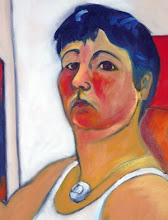Science still doesn’t fully understand aging. While it’s often suggested that it is simply a wearing out, much as a car engine wears out over time and use or a rock weathers and grows smaller, the fact remains that certain biological organisms don’t age and it seems to be built into our genes. The simplest story of the human body is that our cells have a lifespan and before they die they replicate themselves. Over time their replications decrease in quality, so to speak, and quantity, until we are worn out and old and then finally we just break down completely.
I have just stepped onto the path of confronting my own mortality and my own aging. I have been blessed with excellent genes and even though I’m in my middle forties I look younger. Right up to a couple of years ago I could easily pass for my twenties and could find myself carded buying a bottle of wine. Superficially I still appear to be a young woman.
My own mother has the same fabulous genes. I remember well how people always mistook her for my sister, or later on assumed we were a lesbian couple (amusing dinner party stories in there!). She always spoke of age as being immaterial when I was growing up and I believed her because she was living proof, and of course she was my own personal deity. Her own crisis with aging and its effects hit her around fifty years old and all the smug belief that aging didn’t matter flew out the window like a brick.
It’s a chicken and age question, literally, whether her crisis was assisted by her beginning to see a man ten years her junior or whether she started seeing him because she was having a crisis. All I can say for sure, from a personal viewpoint, was that her crisis of faith shook me. My own, however, still lay in the future. I approached it with less sanguine self-confidence after my mother crashed and burned on the altar of impending mortality and all the loss of beauty and vigor that it implied, but nonetheless it was a shocking surprise those first signs of age. No, I lie. The very first sign of aging on my part was the first silver hairs to start sprouting out of my scalp and it was my mother that dealt with that crisis as a personal affront to her own battle. She plucked them out of them top of my head before I could even open my mouth to protest.
My own inklings might have started with the contact lens a couple of years ago. My job came with some benefits and I decided to succumb to vanity. They didn’t last long. Besides the fact that they felt weird and didn’t improve, something about the shape of my eyeballs having changed with age, but when I looked in the mirror for the first time I could see my middle-aged face staring back at me. Friends will laugh at that comment, strangers envious of my apparent youth will sneer, but the reality is that my skin is no longer young. It has lost its elasticity and while I don’t have wrinkles the delicacy have my features has been changed for a sort of stodgy solidity. My neck is beginning to sag, my teeth are not what they were, and my joints ache.
As I said I am just on the beginning of the path, but I’m not so far away from the same age my mother was when she had her crisis and then spent years trying to come to terms with it. If I were to bring it up casually in conversation most people don’t want to talk about it. They divert the topic by telling me I look young, as if being young was the most important thing in the world. They tell me that old trope “you are only as old as you feel”. I don’t feel that young anymore, and I don’t believe I should. I like being a grownup and I don’t mind all the experience, knowledge, and hopefully wisdom that the years bring with it. I’m not even that vain over my looks anymore that I will start wearing turtleneck sweaters to hide my incipient chicken neck (or those weird big collars that Candice Bergen wears in Boston Legal all the time). In fact from a scientific viewpoint it’s actually very interesting watching the inevitable decline of the human machine that is the body – if only it weren’t my body I was watching decline.
New release: DAY OF FIRE, A Novel of Pompeii
-
I'm proud to host a release day for *A DAY OF FIRE*: *A Novel of Pompeii*
by bestselling authors Stephanie Dray, Ben Kane, Vicky Alvear Shecter, Kate
Quin...
10 years ago










